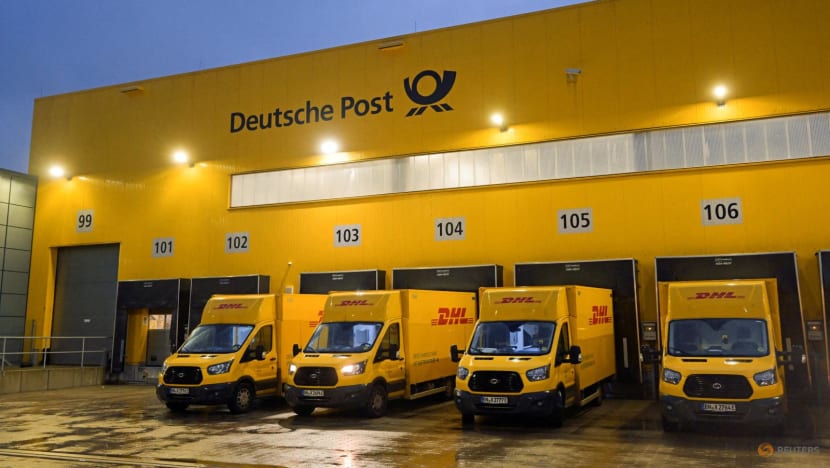DHL to cut 8,000 jobs as part of US$1.1 billion cost-saving strategy

Delivery cars are lined up at a distribution centre of German postal and logistics group Deutsche Post DHL in Hamburg, Germany, on Dec 8, 2022. (File photo: Reuters/Fabian Bimmer)
DHL unveiled plans on Thursday (Mar 6) to cut about 8,000 jobs in Germany this year as part of a strategy to save more than €1 billion (US$1.08 billion) by 2027, after the the logistics group reported a 7.2 per cent fall in annual operating profit.
The job cuts, representing more than 1 per cent of the total workforce, will occur in the Post & Parcel (P&P) Germany division through attrition, rather than compulsory redundancies, DHL CEO Tobias Meyer told Reuters in an interview.
Logistics firms are likely to see slower profit growth this year due to a normalisation of yields, softer demand and easing supply-chain disruptions, Parash Jain, HSBC's global head of transport and logistics research, said ahead of the results.
Jain expects logistics firms to cut costs, with growth in global container trade and air freight tonnes expected to halve in 2025.
DHL shares have underperformed the wider logistic sector over the past year, falling nearly 11 per cent by Tuesday.
Meyer said there are no plans to separate the P&P business, although it has struggled for years with cost inflation and declining letter volumes.
The new stamp price guidelines approved by Germany's network regulator are insufficient to address these issues, according to Meyer.
Meyer cited the recent wage agreement with the Verdi labour union, which includes a 5 per cent wage increase and more holidays, as a reason for the job cuts. The agreement will cost DHL about €360 million by the end of 2026, according to Meyer.
DHL logged €5.89 billion in 2024 earnings before interest and tax, surpassing analysts' expectations of €5.81 billion in a company-provided consensus.
For 2025, the group expects an operating profit of more than €6 billion, which is below analysts' expectation of €6.29 billion. The forecast does not account for potential impacts from changes in tariff or trade policies.
DHL continues its investor return policy by proposing a stable dividend of €1.85 per share for 2024 and increasing the share buyback programme launched in 2022 by €2 billion to up to €6 billion and extending it until 2026.
"WE LIVE IN A VOLATILE WORLD"
In an interview with CNA’s Roland Lim, Meyer said the company had a “relatively soft” start to 2024 but saw “positive momentum” throughout the year.
Despite a drop in annual operating profit, DHL closed last year with strong revenue and earnings growth. In the fourth quarter, the group reported a 6.4 per cent increase in revenue to €22.7 billion and a rise in its operating profit, or earnings before interest and taxes, by 12.9 per cent to €1.9 billion.
“We live in a volatile world,” Meyer noted.
“(We are watching out for) growth markets in Southeast Asia, which is a region that we’re generally very excited about. But we also need to watch efficiency. We want to deploy technology that is available to us to drive labour efficiency, but also to continue to improve the quality of our service.”
Meyer also addressed the issue of tariffs.
US President Donald Trump said on Tuesday he would move ahead with reciprocal tariffs against its trading partners on Apr 2.
DHL has been relocating Chinese staff abroad to destinations chosen for its “China Plus One” diversification strategy that include Europe, southeast Asia, and Latin America, to better serve Chinese customers.
China and the US have been locked in a trade war since 2018.
When asked if DHL’s clients are changing tack due to this, Meyer said the firm has seen manufacturing shift to places like Vietnam, which is increasingly playing a bigger role in electronics.
“We do see Chinese companies internationalising as European companies have 50, 60 years ago. And that's something that I think generally is positive, and we want to be part of that,” he added.
Meyer said DHL wants to help their customers grow their distribution and manufacturing footprints, such as setting up new electric vehicle plants in Europe.















